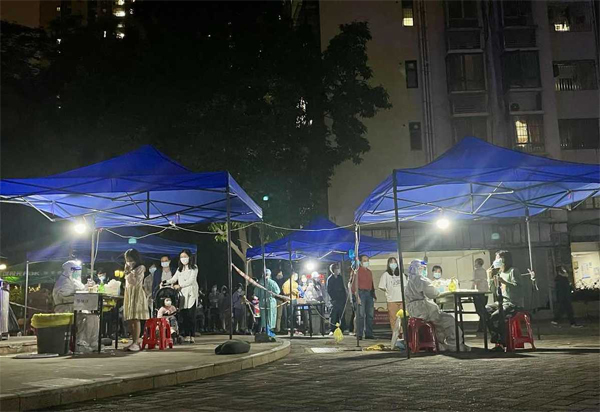Guangzhou continues to battle epidemic

Residents take nucleic acid tests in Haizhu district, Guangzhou, Nov 6, 2022. [Photo by QIU QUANLIN/chinadaily.com.cn]
Construction of fangcang or makeshift hospitals will be facilitated in Guangzhou, capital of Guangdong province, to boost treatment capacity for COVID-19 infections according to a local health official.
"Medical resources at all levels, including designated, secondarily designated and makeshift hospitals, will be optimized and put into operation subsequently, as the number of new infections increased significantly across the city," said Zhang Yi, deputy director of Guangzhou Health Commission.
In a news conference on Tuesday afternoon, Zhang said treatment capacity for infections in makeshift hospitals would be expanded as soon as possible, with a mechanism for transferring infections also being optimized.
As of Monday, the city has opened services for six makeshift hospitals providing more than 20,000 beds in treatment mainly for asymptomatic carriers.
A package of daily necessities including toiletries, earplugs and eye masks is offered for each infection being treated in the makeshift hospitals.
Guangzhou reported its highest level of infections in a single day on Monday, with 147 locally transmitted confirmed COVID-19 cases and 4,977 asymptomatic carriers.
There have been no reports of patients in serious or critical condition since the city's latest outbreak began on Oct 22.
Up to 94.8 percent of new infections on Monday were found in the city's hardest-hit Haizhu district, mainly concentrated in the Kanglu area of Fengyang sub-district.
"The difficulty of epidemic prevention and control continues to increase, as the risk of virus transmission at community level still exists," she said.
Of the new infections on Monday, 30 were detected during nucleic acid tests in local communities or in clinics.
"More efforts will be concentrated to tackle the epidemic situation in Haizhu, with rapid screening and transferring of new infections," Zhang said, adding medical staff will be sent to take samples door-to-door in high-risk areas to detect infections as early as possible.
According to Fu Xiaochu, deputy district head of Haizhu, more than 2,400 medical workers were organized to take door-to-door nucleic acid samples in the district's high-risk areas on Tuesday.
Operation of an inflatable laboratory for COVID-19 testing began on Monday in the district's Pazhou area capable of testing up to 80,000 samples a day.
As of Tuesday, 19,615 infected people from Haizhu have been transferred to designated and makeshift hospitals for treatment, Fu said.



 Print
Print Mail
Mail

